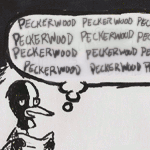|
The Bible is one of Western Civilization's most influential works. Whether you accept it as our Heavenly Father's Truth or treat it simply as another piece of literature one cannot deny the impact that it has had upon us. Surely it is worth discussing the Good Book when it has shaped us for better and for worse as a human race? Disclaimer: I am an active believer in the Bible as well as the Book of Mormon (which is a subject to be discussed in another thread I believe) but I promise to try to keep as much discussion on track about the literary value of the Bible as possible. Hopefully there are people in here more learned than I who can shed light on the various translations and versions that we see, as well as some of the more interesting apocryphal texts that have arisen in more recent times. Disclaimer: I am an active believer in the Bible as well as the Book of Mormon (which is a subject to be discussed in another thread I believe) but I promise to try to keep as much discussion on track about the literary value of the Bible as possible. Hopefully there are people in here more learned than I who can shed light on the various translations and versions that we see, as well as some of the more interesting apocryphal texts that have arisen in more recent times.   Who Wrote This Thing? Well, that is very much one large can of worms. Me, personally, I believe that it was handed down from a divine source but there are many who do not believe this. I welcome discussion into this especially if it can teach us anything about history and literature. Where can I get one? Your local church should be able to get you one for free as well as any faith's missionary elements. You can also often write to church central offices and get extremely nice copies (some leather-bound!) for free! I'm not a Christian. Why should I care? Even if you treat this as a work of fiction others do not and have not, including some very influential people and even countries. Interpretation of the Bible has had a profound effect upon a variety of cultural phenomena and even upon other literature! I have a question about Christianity in general that doesn't relate to the Bible... While I would happily discuss this in another thread I believe that there are more than enough of those other places. If it would be permitted I would prefer to keep this as a discussion of the Bible as literature. What version should I be reading? If we're talking spiritually that is a decision that you will have to make on your own. From a literary standpoint the most common ones are the King James version and the NIV; you can also find a variety of versions such as study bibles, contemporary bibles, picture bibles and even anime bibles in graphic novel form! I encourage discussion of these different versions since there are so many and the rabbit hole goes very deep history wise with them. Thank you, God Bless and I look forward to this discussion.
|
|
|
|

|
| # ? Apr 26, 2024 20:13 |
|
BoothsBeard posted:
Do Mormons have a preferred version of the Bible? I've read that there are many editions of the Book of Mormon and that only the latest editions are authoritative. Is that a casual thing or is citing/using an older version seen as big mistake? Sometime ago I was thinking about getting the free book out of curiosity (been reading a lot of different religious texts as an academic exercise) http://www.mormon.org/free-book-of-mormon If I do that will I have solicitors coming to the door and bugging me or do they just ship it out?
|
|
|
|
Do the Dead Sea Scrolls count?
|
|
|
|
I liked the novel because the main character is, as Dick Dawkins puts it, "jealous and proud of it; a petty, unjust, unforgiving control-freak; a vindictive, bloodthirsty ethnic cleanser; a misogynistic, homophobic, racist, infanticidal, genocidal, filicidal, pestilential, megalomaniacal, sadomasochistic, capriciously malevolent bully." But I heard that he gets nicer in the sequel so I didn't bother to read it.
|
|
|
|
DONT CARE BUTTON posted:I liked the novel because the main character is, as Dick Dawkins puts it, "jealous and proud of it; a petty, unjust, unforgiving control-freak; a vindictive, bloodthirsty ethnic cleanser; a misogynistic, homophobic, racist, infanticidal, genocidal, filicidal, pestilential, megalomaniacal, sadomasochistic, capriciously malevolent bully." God as a character is basically in eternal flux throughout the old testament - depending on the author of that particular section and what they're using God to do, God is either a vengeful dickwad, loving and warm, mysterious and unknowing, literally unapproachable, wandering the desert as a random wrestling nomad, etc etc. I recently finished The History Of God and that was a really enlightening look at the book and the religions historical roots and its cultural impacts.
|
|
|
|
Good idea for a thread, I had thought about making a religious books thread myself. I'm not a Bible expert per se but I do study religion so I'll add what I can. Who Wrote This Thing? The scholarly answer to this is somewhat complicated. The first five books of the Bible are usually attributed to Moses in the Jewish tradition and most Christian traditions. Starting in the nineteenth century in Germany a mode of looking at the Bible called the historical critical approach developed, which tried to examine the Bible as a text produced in a particular historical circumstances (rather than say, written directly by God). An idea called the Documentary Hypothesis emerged, and is still pretty widely accepted, that the first five books were written by around 4 different authors between around 1000 BCE and 500 BCE. The New Testament is another can of worms. If I recall correctly the general consensus among religious studies scholars was that Paul's letters were largely authentic. The gospels though are out of sequence and have a lot of changes. Mark is the earliest Gospel probably written between 65-70 CE, John is the latest written around 90-95 CE. Matthew and Luke rely on a shared source that we don't have, which scholars have called Q, which seems to predate either of those Gospels. The names attached to the Gospels was a later addition, so we really have no clear idea of authorship. Bart Ehrman's work on this is both accesiable and well researched if you want an agnostic, academic take on this stuff. What version should I be reading? I'd just mention that the New Revised Standard Version (NRSV) is pretty much the academic standard in religious studies. Both Oxford and Harper Collins have good annotated study bible if you have any interest in Biblical scholarship. I actually have been meaning to read the Book of Mormon at some point soon, so perhaps that can be a thread in the future. It would be good to talk Nephites with other folks.
|
|
|
|
Zogo posted:Sometime ago I was thinking about getting the free book out of curiosity (been reading a lot of different religious texts as an academic exercise) http://www.mormon.org/free-book-of-mormon
|
|
|
|
Barlow posted:
I've heard that the NRSV is the best version for biblical scholarship but that doesn't necessarily mean it's the best version to read. If you're an English speaker and primarily interested in how the bible has influenced the development of your language and culture then I think the King James Bible is by far the better choice. Not only is the language a lot more stirring but the King James is also the source of many common English turns of phrase. If you had to pick only two bodies of work that have had the most influence on English as a language then it'd probably be Shakespeare and the King James Bible.
|
|
|
|
BoothsBeard posted:Who Wrote This Thing? Can you clarify what you mean by this? Or what the position of the Church of Latter Day Saints is more generally? I understand that it's a fairly conventional Christian position to suggest that the Bible is "divinely inspired", but I think even quite conservative Christians would be happy to say that the Bible was written by men - historically situated - over a period of around 1000 years. And the slow process of canonisation of the books of the Bible, debated for centuries by early Christian theologians, is a matter of historical record. I won't argue with the position that God may have "guided" this process, but given that the Bible's development as a work of literature was a slow and historically contingent one, what does it mean to say that it was "handed down from a divine source"? Barlow posted:If I recall correctly the general consensus among religious studies scholars was that Paul's letters were largely authentic. Well Biblical scholarship puts Paul's letters into three categories:
The "authentic" epistles are basically universally considered to have been written by the historical Paul, though you'll always find a smart-arse willing to challenge at least one of them from time to time. The three "contested" epistles mean just that - that their status as authentic writings of Paul are "contested" by scholars. The division is usually pretty clearly demarcated along the so-called "liberal / conservative" lines. The "liberals" will say that the theology of the epistles is at odds with what Paul wrote in his earlier letters, meaning they must have been written by someone else, whereas the "conservatives" will say that Paul's theology may have developed with time and the the language used is very close to that of the authentic Pauline letters, meaning he was likely the author. The three pastoral epistles are recognised almost universally by serious biblical scholars as being authored long after Paul's death. They describe church structures, for example, that we know didn't exist in Paul's time, and the theology and language used is completely alien compared to what we find in the authentic epistles. Helsing posted:I've heard that the NRSV is the best version for biblical scholarship but that doesn't necessarily mean it's the best version to read. If you're an English speaker and primarily interested in how the bible has influenced the development of your language and culture then I think the King James Bible is by far the better choice. Not only is the language a lot more stirring but the King James is also the source of many common English turns of phrase. Yeah, NRSV is unquestionably the best scholarly work, KJV the most important from a literary standpoint.
|
|
|
|
Blurred posted:Can you clarify what you mean by this? Or what the position of the Church of Latter Day Saints is more generally? The OP is a gbs/BYOB poster and their gimmick is saying stuff like that all the time.
|
|
|
|
If I have time later today, I can write up the authorship of the NT books as surveyed by Carrier in On the Historicity of Jesus -- there is a wealth of scholarship cited in his background chapters, especially about the Pauline and Johannine epistles. I found it very interesting as someone with only a lay knowledge of which books are generally considered to be genuine/contested/fraudulent, and where they fall in the timeline. (Carrier's review of extrabiblical source material is particularly exhaustive, but I guess that's a bit outside the scope of this thread.)
|
|
|
|
|
mdemone posted:If I have time later today, I can write up the authorship of the NT books as surveyed by Carrier in On the Historicity of Jesus
|
|
|
|
Lot of appeal to authority/popularity there. If you've read it, I'd be interested in a critique.
|
|
|
|
mdemone posted:Lot of appeal to authority/popularity there. If you've read it, I'd be interested in a critique. Questioning someone's credentials (and by extension their scholarship) in the field they're writing in is not an appeal to authority, nor is pointing out that the views they espouse are fringe and ar shared by only a tiny minority of other academics in the field. There's a p. solid consensus among Biblical scholars that the Christ myth hypothesis is nonsense; it's (to my understanding) a paradigm with support on par with climate change. Barlow doesn't owe you a point-by-point takedown of the dude's book, he's just pointing that out. I also blame the online atheist movement for propagating Wikipedia's List of Logical Fallacies like it's, well, gospel. For content, have Aslan's Zealot: The Life and Times of Jesus of Nazareth. It's not exactly groundbreaking scholarship - many of his arguments and analyses are drawn from other (denser) sources - but it is super readable and totally accessible. There have been plenty of well-founded critiques aimed at it, but for anyone looking to get their feet wet in Biblical historicity and analysis it's a good place to start.
|
|
|
|
|
Alright, fair enough. As someone with no vested interest, and a generally historicist viewpoint going in, I'll mention that my mind was thoroughly changed by Carrier's work. Most of the interesting stuff was literature review anyway, such that unless he's straight-up lying or misrepresenting, it's going to be hard to successfully refute. And he does address the scholarly-consensus point directly, early in the text. This is not even to mention that Sheffield-Phoenix is a perfectly decent academic press in the relevant field, and the book passed peer review by these same scholars. But this obviously isn't the thread for this. mdemone fucked around with this message at 19:34 on Aug 26, 2014 |
|
|
|
|
i once read that the bible and atlas shrugged are the two most influential books in america, is this true?
|
|
|
|
mdemone posted:If you've read it, I'd be interested in a critique. Almost every thread we get here now on Christianity gets bogged down with arguments about mythicism. I will profess a kind of visceral annoyance that a community that prides itself on thinking rationally about climate change, vaccinations and 9/11 truth assumes that some casual internet based research lets them understand the New Testament better than scholars who spend decades working with Greek and Aramaic texts. I'll stop before I start ranting on this.
|
|
|
|
maev posted:i once read that the bible and atlas shrugged are the two most influential books in america, is this true? Maybe in the Southeastern US, where people will claim certain books are their favorites without actually having read the books beyond lightly skimming them on the weekends (and never finishing them), but for everyone that actually reads a book properly? No.
|
|
|
|
What academic work are you talking about where translations are acceptable? If you are talkingabout real university level theology, theologians read in original languages only, the best editions (truly best, everyone I know uses these) being Nestle-Aland Novum Testamentum Graece (Greek New Testament) and Biblia Hebraica Stuttgartensia (Hebrew Old Testament).
mallamp fucked around with this message at 06:07 on Aug 31, 2014 |
|
|
|
maev posted:i once read that the bible and atlas shrugged are the two most influential books in america, is this true? I definitely would agree that the Bible is. As for Atlas Shrugged, not so much.
|
|
|
|
Does anyone have a link to blurred's old bible history thread?
Baron Porkface fucked around with this message at 21:10 on Oct 3, 2014 |
|
|
|
Baron Porkface posted:Does anyone have a link to blurred's old bible history thread? I found these: http://forums.somethingawful.com/showthread.php?threadid=1557016 http://forums.somethingawful.com/showthread.php?threadid=1560222 http://forums.somethingawful.com/showthread.php?threadid=3297733 http://forums.somethingawful.com/showthread.php?threadid=3381676
|
|
|
|
The Something Awful Forums > The Finer Arts > The Book Barn > The Bible: The Alpha And Omega Thread
|
|
|
|
I really like the Gospel of Matthew. Specifically the Sermon on the Mount: it forms the core of my faith. quote:“And when you pray, do not be like the hypocrites, for they love to pray standing in the synagogues and on the street corners to be seen by others. Truly I tell you, they have received their reward in full. But when you pray, go into your room, close the door and pray to your Father, who is unseen. Then your Father, who sees what is done in secret, will reward you. And when you pray, do not keep on babbling like pagans, for they think they will be heard because of their many words. Do not be like them, for your Father knows what you need before you ask him.
|
|
|
|
maev posted:i once read that the bible and atlas shrugged are the two most influential books in america, is this true? Here's what's likely. Atlas Shrugged has been hyped up by the numerous and ridiculously overfunded libertarian Simply because Atlas Shrugged reflects attitudes and a world-view that's maybe exclusively found in America doesn't mean those originated from the book or that the book changed anything. Those attitudes are actually deeply rooted in Calvinism (more specifically, the meaning of wealth and success as God's approval), a very influential form of Christianity brought early to America by Dutch immigrants and thus owe their prevalance more to the Bible than Ayn Rand. Oromo fucked around with this message at 11:23 on Oct 16, 2014 |
|
|
|
Can we discuss the apocrypha and Gnostic writings in this thread, too?
|
|
|
|
Randall Munroe summed Atlas Shrugged up as succinctly as can be: "I struggled with Ayn Rand because I found myself enthusiastically agreeing with the first 90% of every sentence, but getting lost at 'therefore, be a huge rear end in a top hat to everyone.'" On topic, if you ever find yourself surrounded by people who think of themselves as at least semiserious Christians and you want to watch most of them quickly devolve into a redfaced shouting match, just ask an earnest question about Bible versions and watch 'em go. In an interesting and amusing microcosm of Christianity itself, the few dedicated KJV zealots out there (I am not making this up, there are people around who wholeheartedly believe the English KJV--not the original Hebrew/Aramaic/Greek manuscripts--is the sole inspired dependable Word of God) have struck most others as so repugnant that there is now a sizable contingent of fervent anti-KJV zealots that will automatically dismiss you as a looney toon if you say anything complimentary about the KJV at all. Setting aside religious doctrine because who really cares, once you get used to the -eth's and thou's and such, the KJV is quite possibly the most grammatically and structurally pristine book ever written in English. The subject matter at times gets dull and repetitive, but as an amateur linguist I find the language admirably clean and elegant throughout (unlike the preceding paragraph). The NRSV is all right and as mentioned is the academic standard, but the NIV is a crime against the English language in my opinion. Eric the Mauve fucked around with this message at 05:15 on Oct 19, 2014 |
|
|
|
Eric the Mauve posted:... but the NIV is a crime against the English language in my opinion. Could you expand on why you think that?
|
|
|
|
I like all the goofy stuff in the bible kid killing she bears, naked drunk Noah, talking donkey, Moses wrestling god.
|
|
|
|
Otto Von Jizzmark posted:I like all the goofy stuff in the bible kid killing she bears, naked drunk Noah, talking donkey, Moses wrestling god. and of course the concept of a personal god
|
|
|
|
Otto Von Jizzmark posted:I like all the goofy stuff in the bible kid killing she bears, naked drunk Noah, talking donkey, Moses wrestling god. Don't forget the time some tribe stealing the Ark of the Covenant from Israel resulted in the entire nation they belonged to being afflicted with gigantic, bleeding hemorrhoids (and a plague of rats, I guess) until they returned the Ark along with a bunch of hemorrhoid statues made of gold in tribute to the plague.
|
|
|
|
Seems like an incomplete discussion without the mention of Robert Alter. I'm not a biblical scholar, but he's essentially retranslating the Old Testament piece by piece, using literary innovations in English from Faulkner/Cormac McCarthy/etc. to best recreate the style and cadences of the original text while being faithful. They also have a wonderful commentary. To poach a quick line from Amazon: "He discusses why we need yet another translation, contending that every existing English translation has an anemic sense of the English language, while the King James Version—the most beautiful and literary English-language translation—is unreliable and sometimes inaccurate with the original Hebrew. " He's also written other books about Biblical narrative/translation, and is sort of 'the' guy. So if you're looking for a readable version of the OT, it's quickly becoming the [literary] standard in some places and is nothing if not compelling.
|
|
|
|
The KJV is not without translation problems, but I'm skeptical Robert Alter is likely to do better. Plus I personally regard any attempt at adapting Cormac McCarthy with a hearty dose of skepticism.Ms. Happiness posted:Could you expand on why you think that? The NIV, probably in its dual quests to (1) avoid stretching the reader's vocabulary or forcing the reader to accustom himself to unfamiliar turns of phrase and (b) avoid copying the KJV wherever possible, endlessly employs clunky language, often choosing four or five words to say what another translation will say in one or two. Much of it, especially in the New Testament epistles, reads like a high school student's World Cultures essay. Take any passage of a few verses and read them aloud from the KJV, then NRSV, then NIV; you'll see what I mean.
|
|
|
|
I don't know how accurate this really is, but this is out there, as well. Might explain the quality-of-reading difference you're talking about.
|
|
|
|
I know King James only commissioned that version of the Bible, but can I just say as an aside, that he was also (probably) actually a really decent writer himself? The Kingis Quair is an absolutely wonderful bit of Scottish poetry.
|
|
|
|
Otto Von Jizzmark posted:...Moses wrestling god. It was Jacob who wrestled with God (in Genesis chapter 32).
|
|
|
|
Blind Sally posted:I know King James only commissioned that version of the Bible, but can I just say as an aside, that he was also (probably) actually a really decent writer himself? The Kingis Quair is an absolutely wonderful bit of Scottish poetry. Eh? Which version do you mean? The author of Kingis Quair, King James I, died in 1437. King James Version of the Bible was completed in 1611. Thanks for the Kingis Quair anyway, I have never read Scottish poetry and this one seems interesting.
|
|
|
|
Haha, oops. I made a mistake. I confused the "I" in King James VI & I's title as reference to him being King James I of Scotland, and thus the person attributed with writing The Kingis Quair. He's not, because he is actually James VI of Scotland and James I of England. Rookie mistake, and I feel silly for making. Still, yeah, The Kingis Quair is a really great example of Middle Scots poetry. It's worth taking the time to learn a little Middle Scots (not hard at all if you're comfortable with English), because it's an incredibly fun poem to read aloud.
|
|
|
|
Eric the Mauve posted:The KJV is not without translation problems, but I'm skeptical Robert Alter is likely to do better. Plus I personally regard any attempt at adapting Cormac McCarthy with a hearty dose of skepticism. KJV Genesis 25:30 And Esau said to Jacob, Feed me, I pray thee, with that same red pottage; for I am faint: therefore was his name called Edom. Alter's Version. And Esau said to Jacob, "Let me gulp down some of this red red stuff, for I am famished." Therefore is his name called Edom. Alter's note. 30. Let me gulp down some of this red red stuff. Although the Hebrew of the dialogues in the Bible reflects the same level of normative literary language as the surrounding narration, here the writer comes close to assigning substandard Hebrew to the rude Esau. The famished brother cannot even come up with the ordinary Hebrew word for "stew" (nazid) and instead points to the bubbling pot impatiently as (literally) "this red red." The verb he uses for gulping down occurs nowhere else in the Bible, but in rabbinic Hebrew it is reserved for the feeding of animals. This may be evidence for Abba ben David's contention that rabbinic Hebrew developed from a biblical vernacular which was excluded from literary usage: in this instance, the writer would have exceptionally allowed himself to introduce the vernacular term for animal feeding in order to suggest Esau's coarsely appetitive character. And even if one allows for the semantic evolution of this particular verb over the millennium between the first articulation of our text and the Mishnah, it is safe to assume it was always a cruder term for eating than the standard biblical one. Edom. The pun which forever associates crude impatient appetite with Israel's perennial enamy, is on 'adom-'adom, "this red red stuff."
|
|
|
|

|
| # ? Apr 26, 2024 20:13 |
|
Blind Sally posted:Haha, oops. I made a mistake. Well, he may not have written that Poem, but he did write possibly the earliest anti-smoking pamphlet, A Counterblaste to Tobacco. Here's the final sentence: quote:A custome lothsome to the eye, hatefull to the Nose, harmefull to the braine, dangerous to the Lungs, and in the blacke stinking fume thereof, neerest resembling the horrible Stigian smoke of the pit that is bottomelesse.
|
|
|





























